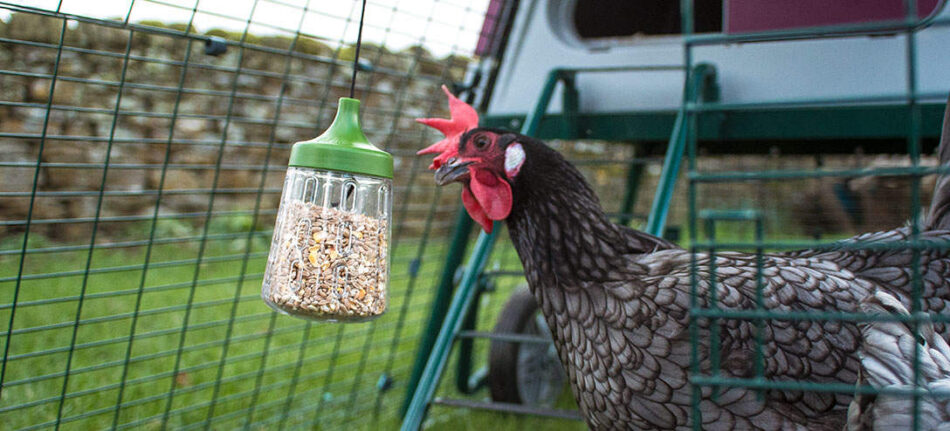How Do You Stop Your Chickens Getting Bored?
Ever heard the expression ‘cooped up’? It means being stuck indoors with nothing to do, resulting in frustration and boredom. We tend to lock hens in a chicken coop, and that’s where the saying comes from.
A hen kept in a shed with nothing to do will soon start to show all the signs of boredom, just like a human. She may start pecking at her neighbours, or plucking out her own feathers. If blood is drawn, the other hens will often join in the beak-attack, and hens can actually be killed in a frustrated frenzy of pecking.
With nothing better to peck and scratch at, chickens may also start to eat their own and other hens’ eggs. Once a chicken becomes an egg-eater, it’s very hard to make her kick the habit.
Bored birds will also tend to sit in the egg box all day, and may become weak through lack of exercise. Boredom also causes stress, and stress can bring egg production to a temporary halt.
Bidding Bye-Bye to Bantam Boredom
As usual, prevention is the best cure, and there are many ways of stopping boredom from becoming a problem in the chicken run. The general rule is simple enough – don’t keep hens cooped up!
- Room to Roam – Give your chickens as much outdoor space as possible. If they have a garden or meadow to peck and scratch in, that’s ideal. You don’t have to worry about rounding the birds up in the evening – as soon as the sun dips in the west, hens instinctively head for the safety and security of the coop. All you have to do is close the door behind them.
- Weather the Storm – A day spent indoors is a day of boredom for a chicken. They should only be confined to the coop if the weather is particularly bad. A bit of rain, snow and wind will not harm them, no matter how unpleasantly muddy the run may look to you.
- Fowl Play – Chickens need stimulation, like most animals. Provide plenty of perches for roosting and resting, along with ladders, and a few pots, tree stumps or ornaments of different heights for them to clamber on and off. Many hens enjoy a chicken swing, too, as if they were parrots in a previous life.
- Treats to Eat – Concealing a few tasty treats in the undergrowth or on ledges is a great way to keep hens entertained. Pack tasty titbits into a wicker ball, place it on the ground, and watch your hens enjoy a game of football as they eat. Alternatively, hang greens or a veg-filled treat holder just out of reach, so that the birds have to jump to get a beakful. Shop-bought or homemade suet-and-seed pecking blocks keep them coming back for more, too. The treats should not be overdone, though, as healthy diet is an essential part of good chicken care.
- Making Hay – A pile of hay, straw, leaves or garden compost will give your hens something to scratch and rummage through, and they will find probably a few tasty worms and beetles to eat during the fun. Piles of vegetation will be levelled in no time at all – chickens remove piles, you could say!
- Novelty Value – Chickens will be fascinated by anything new in their runs, even something as simple as a box or tray of straw, or an old brush. They are also fascinated by their own reflections, so an old mirror can be a good distraction. An old alarm clock or large watch with a reflective glass surface and a loud tick will intrigue them, too.
- Dust to Dust – A dust bath goes down a treat at any time of year, not just in the hot summer months. If the weather is wet, you could provide a dry earth bath in a sheltered part of the run or coop.
- Quality Time – Don’t underestimate the importance of interaction with your hens. Once they come to trust you they will relish your company, like any other friendly pet. Admittedly this can sometimes get a little out of hand, when hens start to flap onto the garden table to see what you’re eating, drinking or reading!
Boredom really doesn’t have to be a problem in the chicken run. As long as your hens can satisfy their strong scratching and perching instincts, and have a little fun along the way, they will remain healthy and happy.
This entry was posted in Chickens
